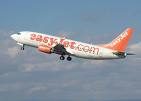easyJet angered by EU slot proposal
 In a letter to all 27 European Commissioners, easyJet has called on the EU to “avoid narrow-minded protectionism by a few legacy airlines appealing for state aid through the back door.“easyjet claims that some airlines, led by the Association of European Airlines, are asking the European Commission to consider a suspension of the rules governing slot usage at Europe’s major airports. EasJet believes this is intended to prevent other European airlines from using scarce slots that would be freed-up by cutbacks expected for this year. It is understood that the Commission is indeed preparing a proposal to suspend existing rules on slot allocation.
In a letter to all 27 European Commissioners, easyJet has called on the EU to “avoid narrow-minded protectionism by a few legacy airlines appealing for state aid through the back door.“easyjet claims that some airlines, led by the Association of European Airlines, are asking the European Commission to consider a suspension of the rules governing slot usage at Europe’s major airports. EasJet believes this is intended to prevent other European airlines from using scarce slots that would be freed-up by cutbacks expected for this year. It is understood that the Commission is indeed preparing a proposal to suspend existing rules on slot allocation.
The AEA has publicly called on the EU to allow them to keep their slots for one year even if they do not use them. Under the EU’s so-called ‘use it or lose it’ rule, airlines have to use their slots for at least 80% of the time or return them to the slot pool, so that other airlines can make use of them.
Andy Harrison, easyJet Chief Executive, said:
“This is not about protecting the industry; it’s about propping-up a few poorly-run, inefficient network airlines with out-dated business models that cannot adapt to the demands of modern consumers.
“This idea does not have the support of the industry, and it is not consistent with the objective of supporting the industry. If unused slots are in demand they will be taken up by other airlines, helping consumers and local communities in the process, and the industry as a whole. However, if unused slots are not in demand they will remain available to be used by airlines.
ADVERTISEMENT
“A slot freeze helps inefficient, legacy airlines to hoard scarce resources from European airlines that are ready and willing to use them. Implementing such a measure would lead to fewer flights, and higher fares, thereby exacerbating the economic situation, not helping it. We must resist this lurch back to the stone age of protectionism.”
The Association of European Airlines points the finger at rising airport pricing as their motive for lobbying the EU Council. The AEA said that the adoption of the EU’s Airport Charges Directive by Council
on February 19th is an ‘important first step’ in addressing a serious deficiency in the
air transport value chain, but believes that current pricing practices of airports, as yet
not covered by the new rules, are seriously damaging airlines.
Up to now, major airports have been able to impose price increases on their airline
customers on a ‘take it or leave’ basis. Said AEA Secretary General Ulrich Schulte-
Strathaus: “Many passengers do not realise that airlines pay for the infrastructure
costs in the form of fees and charges; because airlines cannot simply fly to the airport
which charges the lowest fees, but to the destinations their passengers have chosen,
airports are natural monopolies. Twice in the last ten years, legislative proposals by
the EU Commission to tackle the issue of monopolistic airport behaviour were
rejected by Member States. This time the EU institutions adopted a balanced proposal
which, while by no means ideal, is an important first step in remedying this situation”.
“Right now, one after another, major airports are pushing up their charges”, said Mr
Schulte-Strathaus. “They do not see the need for sharing the consequences of the
economic crisis with their customers, the airlines. Just one example: Copenhagen,
profitable to the tune of €160 million in 2008, is seeking to increase its fees by 8% as
from 1st April 2009, without any kind of prior consultation. By practicing this kind of
profit protection despite plummeting traffic figures they totally ignore the situation of
the airline industry”.
The Directive, he said, would place on the airports an obligation to consult with their
airline customers, to provide transparency in their pricing calculations, and subject
them to the jurisdiction of an independent national regulator; these principles would be
applied throughout the European Union on the larger airports and thereby increase the
pressure on all key airports to become cost efficient.
——-

